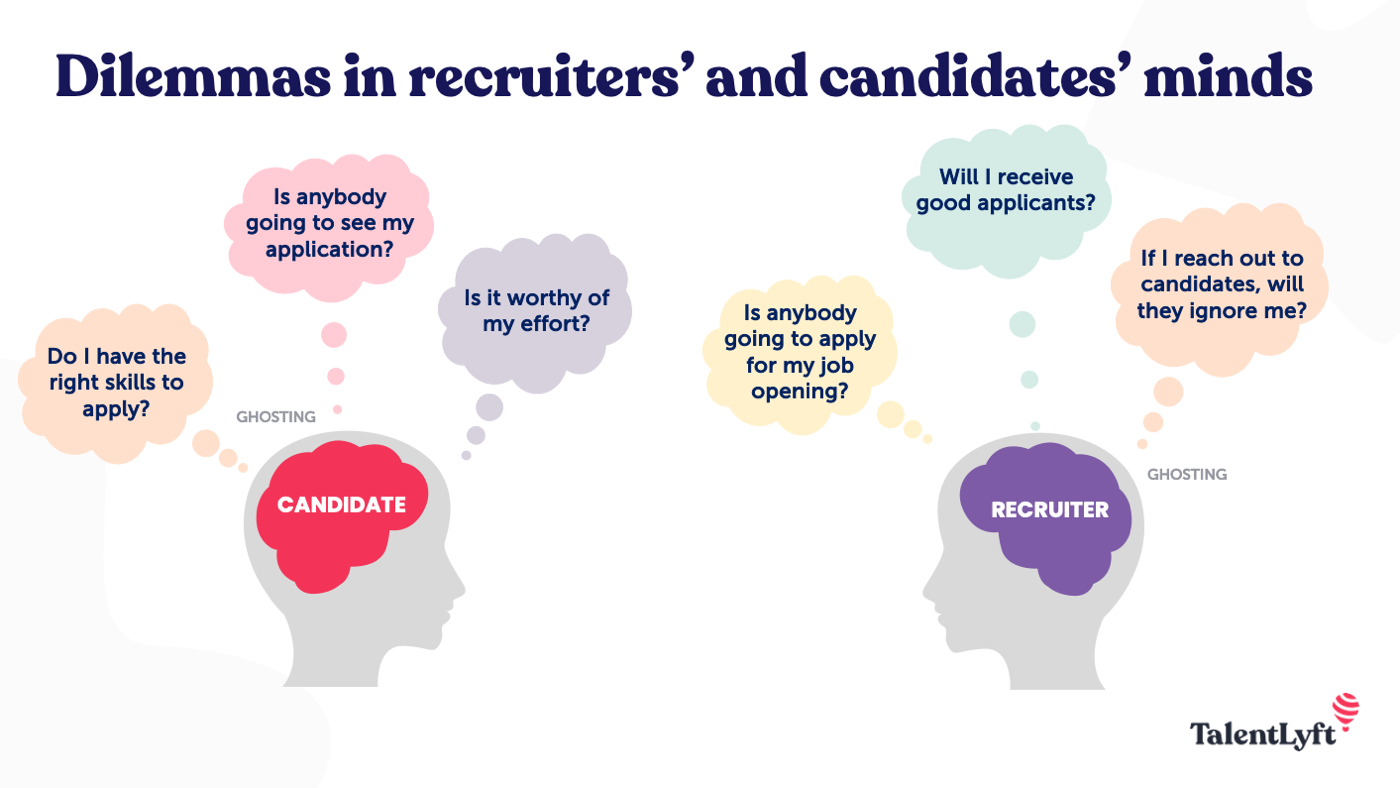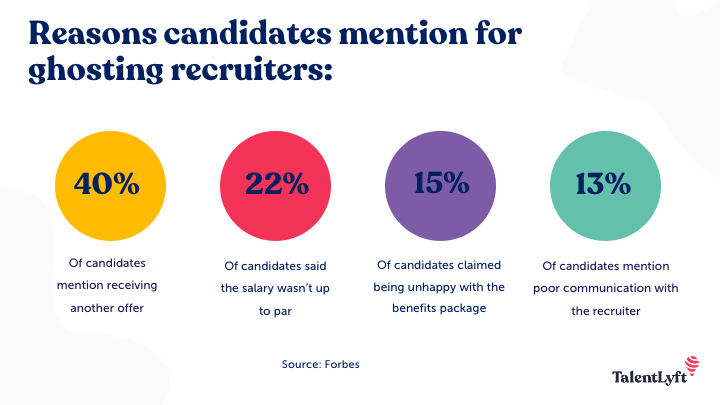![https://adoptostaging.blob.core.windows.net/article/0c69FFsPh0edyjc5ffQDTQ.png]()
Growing frustration among recruiters & candidates
Currently, employees are experiencing a renaissance and are starting to value their time and expertise more. According to a recent survey from Catalyst; around 50% of all employees in America want to leave their jobs. One of the main reasons they mention is a feeling of “lack of empathy or understanding from their employers” which caused a bad overall experience and they are looking for a change.
At the same time, these under-appreciated employees are looking for different experience from the first touchpoint they have with a company they decide to apply for. More specifically, research shows that 95% of candidates believe that there’s a direct correlation between how they are treated as candidates and how they’ll be treated as employees, indicating that providing a good candidate experience can help you build a loyal workforce.
Hire long-term talent with TalentLyft
Work on building relationships with your candidates from the first touchpoint you have and improve overall candidate experience!
Learn more While candidates are looking for a more personalized approach and more frequent communication during a selection process, on the other side - we have overworked burned out recruiters to whom the notion of building a long term relationship with every candidate seems like an impossible task to achieve.
Learn more about what we can do to increase recruiters' wellbeing on the link! → Let’s Think About Recruiters Wellbeing
“Ghosting” is adding fuel to the fire
The thing that additionally builds up frustration for both candidates and recruiters is the lack of communication and a frequent ghosting.
“Ghosting” is a term that comes from the world of dating as an expression that refers to “the practice of ending a personal relationship with someone by suddenly and without explanation withdrawing from all communication” (source: Oxford Languages) became a relatively frequent practice in the world of recruitment.
Similarly to the dating world, in recruitment, candidates (and recruiters) try to avoid the unpleasant situation of rejection so instead they decide to avoid the problem by not responding, and essentially disappearing from the conversation. However, unlike dating, ghosting in recruitment has, besides evoking negative feelings, a negative outcome on businesses.

Based on research from CareerBuilder, more than two thirds of hiring managers are saying that candidates dropping off during the application process is a problem for their company. Additionally, a research from Indeed found that 28% of candidates ghosted their prospective employers in 2021, which is a high 10% increase since 2019 - when only 18% of candidates were doing the same.
Why are candidates ghosting you?
Based on a recent article from Forbes, the four most common reason why candidates ghost you include:
40% of candidates mention receiving another offer
22% of candidates said the salary wasn’t up to par
15% of candidates claimed being unhappy with the benefits package
13% of candidates mentioned poor communication with the recruiter

Additionally, it is interesting to see that candidates ghost their potential employers in all phases of the recruitment process, regardless of the seniority or demography. Since ghosting is so widespread, it is important to have in mind that it is also inevitable to avoid it entirely which shouldn’t make you feel any less successful as a recruiter.
But instead of focusing on what you cannot avoid, let’s focus on the things you can!
The importance of building relationships with your candidates
All four reasons that candidates from the previous paragraph mention as the most important factors for ghosting recruiters can (at least partially) be prevented with timely and consistent communication. And, even though candidates receiving another offer may sound like a situation that you couldn’t have prevented, there are still some things that can be done about it.
The connection you make with your candidates from the start of their application process is where you should start building your relationships in the digital space. Building relationships and nurturing their interest in your company from the first moment they decide to apply for a position is what makes you unique as an employer and minimizes your chances of getting ghosted in the end.
So, what will help you in building digital relationships?
Sending timely updates
Transparent communication
The process of building a relationship with your prospect candidates starts with the first touchpoint you have with them. Whether a person found your job opening on your company's career site or stumbled upon it through social media or job boards, it is essential to create a feeling of presence and that their application will be carefully considered. Here is where employer branding can have a lot to do with your success.
When a candidate hasn't yet applied for a position, you have limited possibilities to prove your responsiveness to them. But, making sure to always send a confirmation of their application with information about the next steps in the recruitment process once they do apply, can help you create a strong employer brand for future applicants.
Timely & transparent communication
Once candidates actually hit the “apply” button, you have much more power to do stuff the right way. However, unfortunately this is precisely where so many HR departments have it wrong by either never contacting the person again or just contacting them two years later to apply for a new position.
Based on Talent Board Candidate Experience Benchmark Research Report, 52% of candidates claim not receiving any communication in the two to three (or more) months after applying. At the same time, 81% of job seekers say employers continuously communicating status updates would greatly improve their candidate experience (source: pipeline.zoominfo.com)! Therefore, being timely in your communication with the candidates allows them to feel involved in the process, and decreases the chances of them losing interest and ghosting you.
Send timely updates to your candidates with TalentLyft
Set up automated messages triggered once an applicant submits a form to create a more strategic approach to your recruitment marketing!
Try now Besides sending timely updates to your candidates, being transparent with them is another element that can help you minimize ghosting. In the previous paragraph we listed the top four reasons candidates mention as being main factors for ghosting their potential employers. Three out of four reasons have directly to do with the salary and the benefits they can receive.
Having a transparent communication about your company culture, the pay range and the benefits they can expect or their potential for growth leaves no space for assumptions and makes candidates know exactly what to expect from you as an employer. Sometimes this means you will lose them, and sometimes you will end up hiring them. But ultimately, you will work on your relationship with them and set the ground for future opportunities.
Good candidate relationship will matter in the long run
Besides offering a good candidate experience with your timely and transparent communication and minimizing your chances for getting ghosted, you will also work towards hiring team members for the long run. As mentioned earlier in the article, a high percentage of candidates see a direct connection with a positive candidate experience and employee experience.
Obviously, if you are in the situation where your candidate ghosted you after your first attempt to get in touch with them, it will be really difficult to build relationships with them. Ultimately, some of those ghostings are not even worth your struggle. But, an important thing to take from this is that candidates, just like you, are looking for respect and transparency, which is a two-way street. The more you invest in building relationships with them from the start of their candidate journey, the more you will be able to avoid unpleasant situations - such as the infamous ghosting.
Adapt your recruitment strategies for different generations of workers
While Gez Z is looking for more time off and a good work-life balance, boomers are focused on career advancements. Learn about other differences and how you can adapt your recruitment strategies for different generations of workers!
Learn more 













